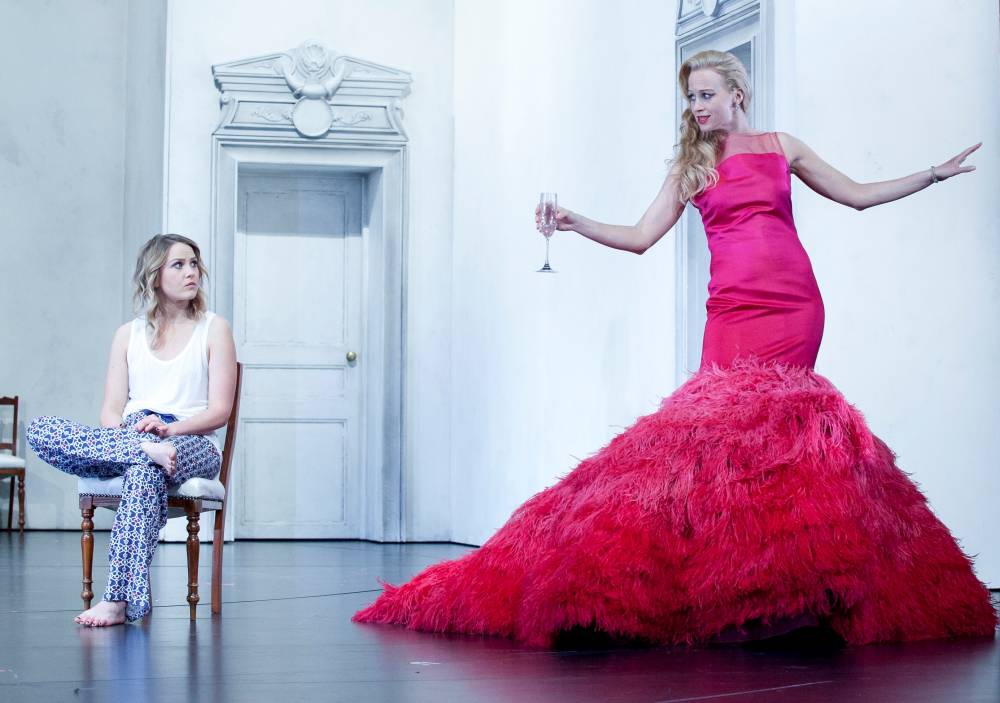
Young love is so easily dismissed by jaded older lovers with multiple (failed) experiences, but a teenager can be consumed by passion much as molten lava devours all in its path. When Juliet is well cast, and the actress truly lives that passion as well as the anguish of her character’s predicament, she becomes one of the most potent forces in all Shakespeare. The younger (or younger-looking) the actress, the more potent that force can be for the audience.
Director Kip Williams has found a memorable Juliet for this Sydney Theatre Company production in Eryn Jean Norvill. She fizzes with the zest of youth, feels all emotions like thunderbolts and makes the glorious language live as if fresh-minted for her mouth. Equally importantly she is impish and likeable, for if we do not care for her there is no play.
Shakespeare created a much more strongly defined Juliet than he did Romeo. We can scrutinise Juliet’s interaction with her mother, father, nurse, Friar Laurence, Paris and, of course, Romeo, and note the changes in her behaviour. Romeo has a narrower range of guises, and speaks in flightier but less exultant verse. Great Romeos are not an impossible species, but a rare one. Dylan Young’s performance gains as the stakes intensify but, fundamentally, he has created a character which we can understand being besotted with Juliet, but not a character that justifies the intensity of her reciprocity.
The Nurse is a beloved role for actresses of a certain age, and Julie Forsyth laps up this character who is blessed with one of the biggest hearts in all Shakespeare. Hers is a feisty as well as a doting Nurse, and all the laughs are milked form the text even if some caricaturing is inherent.

Refreshingly the casting of Lady Capulet takes its cue from her own line of being no older than Juliet when she, herself, was wed, and Anna Lise Phillips is a youthful, committed socialite, with only intermittent interest in a daughter who may blooming into too great a beauty for comfort. She is married to a much older husband in Colin Moody, who is stern to the point of being forbidding, and perhaps could sometimes have lashed his household with a colder, quieter tongue, rather than one always red-hot.
Standing out among the rest is Eamon Farren’s Mercutio, a hyperactive, fearless, fun-loving, knockabout bright spark realised with a flair for rubber-limbed, almost acrobatic movement and a voice that presents the verse sliced to a nicety.
Williams has cut the Montague family out of the Shakespearian will – at surprisingly small loss to the text. This refocusses Juliet’s plight as being not so much that she has fallen in love with a lad on the wrong side of a blood-feud, but that she is obliged to counter the will of her despotic, patriarchal family.
David Fleischer’s use of a revolve in the first half creates all sorts of spaces in which Williams can set his scenes and have characters escaping and chasing. The use of a bare black stage for the final acts is quite confronting after so much movement and change, and it seemed the actors had to be slightly amplified to project from the barren space. Fleischer then creates a stunning image for the final scene, with Juliet and Tybalt each occupying one of 12 white double beds that depict the Capulet family crypt. Confirming the degree to which he has made this Juliet’s play Williams does not let us see her suicide, instead bequeathing her the final words, usually spoken by the Prince (or Capulet when no Prince is cast): “For never was a story of more woe/Than this of Juliet and her Romeo.” Her death is left to our imaginations after the curtain falls.
I would probably prefer to have the image of their two bodies entwined in death, but this is a strong ending, nonetheless, and caps a production that confirms the impression created by Williams’ production of Under Milk Wood: here is a director who joins Damien Ryan in being capable of presenting a verse play in a way that allows us to relish the language.
Until November 2.